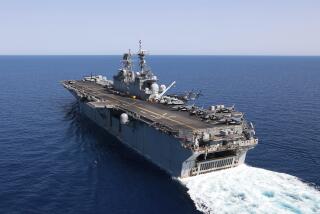In Drawing a Line in Gulf, Will We Be the One to Trip?
- Share via
“Earnest Will” is a fine public-relations, image-making name for the U.S. Navy’s convoying of Kuwaiti tankers, with the Stars and Stripes snapping on the mast, through the Persian Gulf. The code name gives a desired illusion of resolute action. The United States has drawn a line in the hot and hazy sea and said to Iran: “Thou shall not attack these tankers.”
The line-drawing, coming amid the Administration’s embarrassment at the Iran- contra hearings, is being presented to the public as a test of whether America is and will remain a superpower. The test is more complicated and risky than, say, the exercise of power in Grenada. It more nearly resembles a previous Middle Eastern action: the placement of Marines in Lebanon.
If the convoy route can be kept free of mines and if nothing unexpected occurs, the Persian Gulf operation will succeed in a narrow sense. But, as last Friday’s mine-blasting of the tanker Bridgeton illustrates, such “ifs” are very large.
Both the history of the Middle East and the nature of naval operations, especially in the ambiguous conditions of quasi-war, breed the unexpected. The line may be effectively drawn against attack by Iranian planes or Silkworm missiles. Mines are another matter. Attacks by irregular, sea-going guerrillas in rubber boats are often difficult to ward off at night because, if there is a high sea running, such tiny craft are hard to see on radar.
And what of terrorism on land, anywhere in the world, by unidentified attackers who may or may not be under Iranian orders? Does the United States then declare that the line has been crossed and unleash retaliation?
The greatest uncertainty, however, involves U.S. policy at the highest level. Earnest Will implores that the course of events in the Persian Gulf can be shaped by determination alone. But the brave words do not reveal the larger objectives to be so earnestly sought, and that is the problem.
In general terms President Reagan and his spokesmen over the past year have said that Washington seeks to ensure the uninterrupted flow of petroleum from the Persian Gulf to friends and allies, to block the expansion of Soviet influence, to end the eight-year war between Iraq and Iran and to hold the door ajar for better relations with Iran when and if the fanaticism associated with the Ayatollah Ruhollah Khomeini moderates.
Sometimes, however, the Administration sounds as if the greatest threat in the gulf is Soviet expansion. But the United States and the Soviet Union cooperated to secure a passage for a recent U.N. Security Council resolution calling on Iraq and Iran to end their war. White House Chief of Staff Howard H. Baker Jr. has said that there are possibilities for further Soviet-American cooperation--but he has been contradicted by other spokesmen. Where do we stand on this crucial point?
We declare our impartial support for an end of the Persian Gulf war negotiated by Iraq and Iran. But Earnest Will, directed exclusively against Iran, tilts us toward an implicit alliance with Iraq, and Iraq is a Soviet client. Will the United States acquiesce in further Iraqi warfare against the flow of oil out of Iran? If the answer is yes, the United States will be virtually at war with Iran. That will mean locking the door against the likelihood of accommodation with a post-Khomeini regime. As long as it tilts toward Iraq, the United States is held hostage to Iraqi action. Baghdad will be able to determine how deeply the United States will be drawn into the war.
It is easier to point to danger than to prescribe a safe course. There is no safe course. Iraq started the war by attacking Iran in 1980, and now would like to end it. The temptation is to try to force Iran to the peace table, but Iran has shown itself impervious to military and economic pressure. An escalation of conflict between Iran and America would intensify the support of the Iranian people for the ayatollah’s regime and lead to military commitments and bloodshed that the United States could not afford. At a minimum, Washington should do three things: Accept the usefulness of cooperation in the Middle East with the Soviet Union, preferably through the United Nations; beware of falling under Iraqi control, and make clear that operation Earnest Will is useful only in a very limited sphere and does not contain a solution to the larger problems of U.S. policies.
More to Read
Sign up for Essential California
The most important California stories and recommendations in your inbox every morning.
You may occasionally receive promotional content from the Los Angeles Times.













